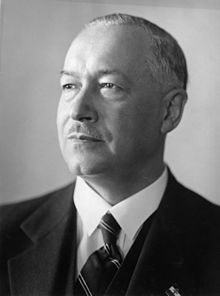Kálmán Darányi
|
Noble Kálmán Darányi de Pusztaszentgyörgy et Tetétlen |
|
|---|---|
 |
|
| Prime Minister of the Kingdom of Hungary | |
|
In office 6 October 1936 – 14 May 1938 |
|
| Monarch |
Miklós Horthy as Regent |
| Preceded by | Gyula Gömbös |
| Succeeded by | Béla Imrédy |
| Speaker of the House of Representatives | |
|
In office 5 December 1938 – 1 November 1939 |
|
| Preceded by | Gyula Kornis |
| Succeeded by | András Tasnádi Nagy |
| Member of the House of Representatives | |
|
In office 31 January 1927 – 1 November 1939 |
|
| Personal details | |
| Born |
22 March 1886 Budapest, Kingdom of Hungary, Austria-Hungary |
| Died | 1 November 1939 (aged 53) Budapest, Kingdom of Hungary |
| Nationality | Hungarian |
| Political party | Unity Party, Party of National Unity, Party of Hungarian Life |
| Spouse(s) | Márta Szemere |
| Profession | politician |
Kálmán Darányi de Pusztaszentgyörgy et Tetétlen (22 March 1886 in Budapest – 1 November 1939 in Budapest) was a Hungarian politician who served as Prime Minister of Hungary from 1936 to 1938. He also served as Speaker of the House of Representatives of Hungary from 5 December 1938 to 12 June 1939 and from 15 June 1939 to 1 November 1939. Darányi was associated with the radical right in Hungarian politics, and although not sympathetic to the Hungarian fascists, pursued an increasingly authoritarian policy at home, and an alliance with the fascist powers Germany and Italy abroad.
His parents were Béla Darányi and Antónia Nagy. His uncle was Ignác Darányi who served as Minister of Agriculture during the Austro-Hungarian Monarchy. Darányi started his civil service career in 1909 at Pest-Pilis-Solt-Kiskun County. After the revolutions of 1918–1919 he served as commissioner then ispán (or official) of Győr County, Komárom County and Győr. Darányi became a member of the Hungarian Diet in 1927. Gyula Gömbös appointed him Minister of Agriculture in 1935. In addition to his political activities he played a directing role in the agricultural class movement. He also took part in the life of the Calvinist Church as a member of the Universal Convent and synod.
He substituted the ailing Gyula Gömbös. After the Prime Minister's death the Regent Miklós Horthy appointed Darányi to Gömbös' successor on 12 October 1936. Darányi wanted to recur to basis of István Bethlen with the program of the conservation of the constitutional order, but he did not want to turn sharply against Gömbös' political testament. He maintained the promise of the secret suffrage, but first of all he wanted to increase the gubernatorial jurisdiction and the House of Magnates' role.
...
Wikipedia
